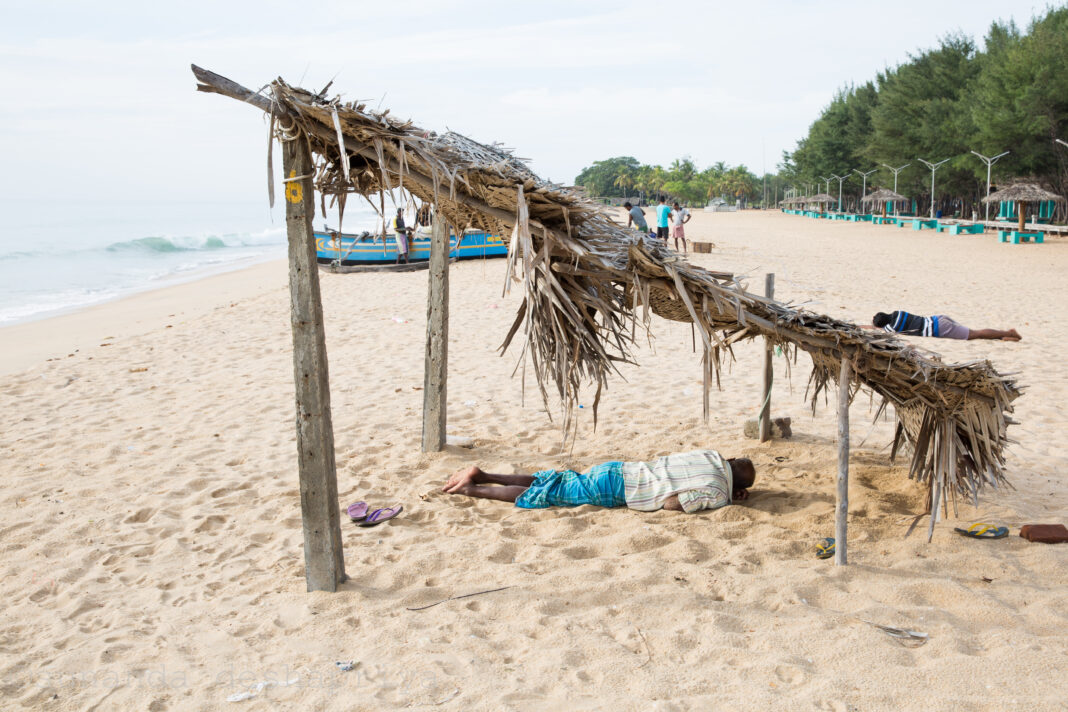Image: File photo of fisherman sleeping in a hut, Batticaloa.
Sri Lanka is in the midst of an unprecedented economic crisis, causing severe hardship to all segments of our society, especially our working people and the poor.
Undoubtedly, the government has a daunting task ahead, and as a country there is a need for us all to come together to overcome this challenge.
At the same time, the government’s approach to resolving the crisis raises some serious questions. Its focus, almost solely on meeting foreign debt obligations, is draining the country of dollars needed for importing essentials for our people. The government’s emphasis on avoiding a default at any cost appears to be downplaying a fundamental question – can our people eat? After all, a country’s pride rests not only in repaying its loans, but also in ensuring no citizen goes to bed hungry.
Recognising this dire situation, a group of leaders from over half a dozen key political parties in Sri Lanka came together in a closed-door meeting on Thursday 27th January 2022, to brainstorm ways to tide over this crisis, given the responsibility we have towards the Sri Lankan people.
I approached parliamentary colleagues and party leaders, in my capacity as a former chairman of the Committee on Public Finance in Parliament. MPs came together in the knowledge that Parliament is expected to have full control of public finance, and that each MP, therefore, also has a fiduciary responsibility to ensure the proper management of public finances in Sri Lanka.
The crisis, we noted, is of a proportion that is historically unprecedented for many reasons:
(1) The country’s ratings have fallen to the level of being blacklisted in international credit markets. Since April 2020, Sri Lanka has been locked out of borrowing using International Sovereign Bonds (ISBs) in the international market
(2) Repaying US dollar debt in this context means that the usable foreign reserves are down to below one month of imports – the lowest on record since independence.
(3) The ratio of interest on debt to government revenue was above 70% in 2020, a historical high for Sri Lanka, and amongst the highest in the world.
(4) The ratio of public debt compared to the value of Sri Lanka’s domestic production (GDP) is also the highest on record, at 120%. It skyrocketed, by almost 25 percentage points, in the last two years.
Each of these situations by themselves would spell a serious economic challenge. Occurring
simultaneously, they threaten our future in both the short term and long term.
In this context, the Central Bank’s policy has been to hoard the scarce dollars to pay creditors in full and on time. This has fueled a shortage of dollars for the needs of our own people, and reduced imports of essential items such as food, medicines and fuel. We see the shortage manifesting in long queues for essential items and frequent power outages. The situation will only worsen over the year, if the government does not urgently shift gear and ensure adequate dollars are available to the Sri Lankan economy.
Already, the government’s rash chemical fertilizer policy has impacted farmers across Sri Lanka, leaving us with an imminent food crisis. The government’s current policy path on debt management, as it was in the case of fertilizer policy, is exacerbating the crisis, without a sensible or viable solution in sight.
Our recent meeting provided a platform for political leaders to share the concerns of their
constituencies and identify the critical issues that require urgent attention. There was wide acknowledgement that the Central Bank hoarding dollars to make lump-sum debt
payments was leading to a shortage of dollars to procure essential supplies within the country. This is resulting in severe economic hardships for the people of Sri Lanka and long-term damage to the economy, while providing windfall gains to the holders of Sri Lanka’s Sovereign Bonds.
We agreed that Sri Lanka should take immediate measures to protect the poor from the adverse impact of this economic crisis, and postpone repaying its debt as a first step. Participating MPs also felt that we need sound reform to the national economic policy to address root causes of the crisis and ensure sustainable solutions.
This group of political leaders agreed to continue engaging and working together towards ensuring justice for the people of Sri Lanka, through solutions that are sustainable. We must steer the country out of this unprecedented economic crisis, and forge an equitable and just future for our future generations.
30 January 2022
